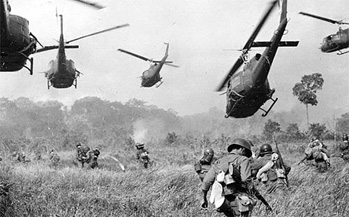TV Recap - The Vietnam War: Episode 1, Part 1
Episode 1
By Mark Light
September 21, 2017
World War II is a pole star in the American psyche. The bookending of the conflict by surprise attack on the US Navy in Pearl Harbor and the discovery of the Nazi concentration camps as Germany collapsed offered clarity. Our enemies attacked us first and they were evil. Clarity is something that is a rarity in war. The realization that particular clarity provided, that we were on the side of the angels, has contributed greatly to our self-assurance as a nation. When a person, most often a politician, talks about American exceptionalism, somewhere towards the root of what they are speaking about is World War II and the clarity it provided.
Vietnam, simply put, did not provide anything close to that clarity. It had no Pearl Harbor, with a definitive beginning and obvious justification. We were involved when it was a French war, and we had only a vague theory of what not opposing Communism in Southeast Asia would mean for the world. We believed that should communism prevail in South Vietnam, the rest of the nations of Southeast Asia would tip over as dominoes, one falling after another. And the war had no happy ending for the US where we stood victorious and proved morally superior. Communism did prevail and South Vietnam fell. Yet, the two key states we were concerned about, Thailand and Malaysia, did not fall like dominoes to the red ideology.
In this series of articles, each episode of The Vietnam War will be split into two recaps as there is so much material and ground to cover. And as is very obvious from the preceding two paragraphs, these recaps will talk about the war from an American perspective. The filmmakers, Ken Burns and Lynn Novick, have included Vietnamese voices in this film, both from the former South and North Vietnams to provide their viewpoint. They have an important perspective as well, but they will mainly be used to inform our own. For though Vietnam provided no clarity, the ten-episode, 18-hour film might help answer one simple question: What happened?
One quick technical note on viewing this documentary; unless you have a familiarity with the Vietnamese language, I recommend you view it with the closed captioning turned on. I have no such familiarity. I had read scores of articles and books that referenced the North Vietnamese general Giap. I was shocked when he was introduced in the film and the narrator said what sounded like Czawp (like the first part of czar with a hard puh on the end). All this time when I read about Giap, I mentally called him Ghee-ap. The closed captioning will help if you are relatively new to the subject and read about it later. You will then know that the Czawp they audibly talk about in the film is the Giap you read about on the page. That is one example of a long list of names belonging to both people and places.
Episode one begins with an American veteran describing how no one talked about the war when he came home for the longest time. Then, to show they are going back to the beginning, the filmmakers engage in an effective technical trick, they run film in reverse. Bombs fly upwards, flames go back into the flame thrower. Political figures are shown in reverse chronological order, from Nixon, thence to Johnson, Kennedy, Eisenhower, Truman, and finally DeGaulle. All this is set to an unsettling score by Trent Reznor. It is established at the very start that we are watching what might be the most well-produced film ever on this subject.
Continued:
1
2
3
4
|
|
|
|




